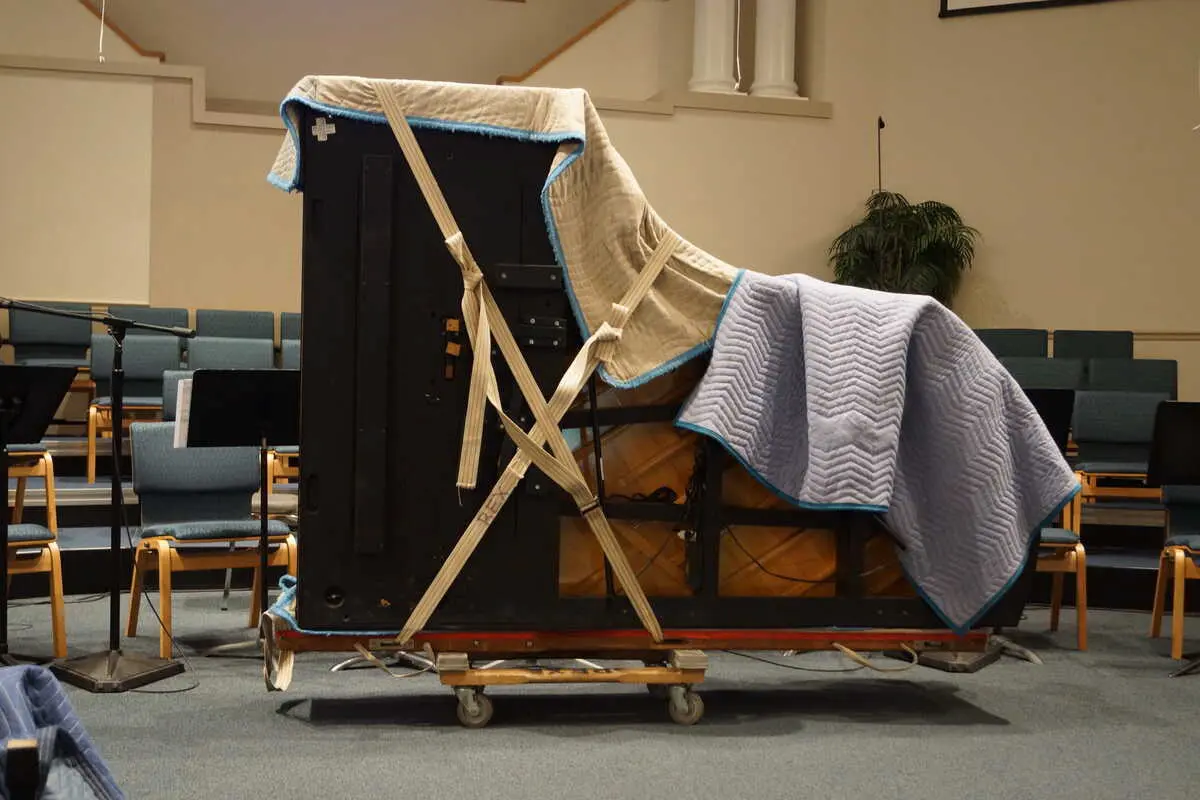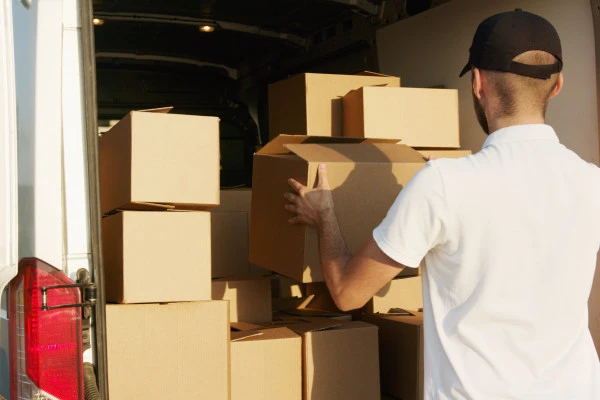How Much Does It Cost to Move a Piano?

Moving a piano is not like moving ordinary furniture. Pianos are both heavy and delicate, making them a challenge to transport. Considering the instrument's value, both monetary and sentimental, many opt for professional services to ensure a safe move.
Types of Pianos and Their Impact on Cost
1. Upright Pianos
General Characteristics: Upright pianos are vertical and are typically less cumbersome than grand pianos, but can weigh between 300-800 pounds.
Typical Moving Costs: $200 - $400
2. Baby Grand and Grand Pianos
General Characteristics: These are larger, horizontal pianos, often weighing 500-1200 pounds.
Typical Moving Costs: $300 - $1,000
3. Electronic Pianos & Keyboards
Differences from Acoustic Pianos: Generally lighter and more portable, but still require careful handling.
Typical Moving Costs: $100 - $300
Factors Affecting Piano Moving Costs
1. Distance of the Move
Local vs. Long-distance: Local moves (within the same city) are typically charged by the hour, while long-distance moves factor in mileage.
Cost Breakdown:
- Local: $200 - $600
- Long-distance: $500 - $2,000+
2. Difficulty of the Move
Challenges: Stairs, narrow hallways, tight turns can add to the complexity.
Potential Surcharges: $50 - $100 per flight of stairs; $50 - $150 for challenging landscapes.
3. Special Equipment Needed
Equipment Types: Piano skid boards, dollies, padding, and straps.
Costs: Often included in the service, but can add $50 - $200 if special equipment is required.
4. Labor Costs
Manpower: Typically, 2-4 professionals are required.
Hourly Rates: $20 - $60 per mover.
5. Insurance
Valuation: Based on the piano's value.
Cost: Basic coverage (usually $0.60 per pound) is often included; additional coverage can range from $100 - $500+ depending on the piano's value.
Benefits of Hiring Professional Piano Movers
- Specialized Knowledge & Experience: Professionals understand the piano's structure and weight distribution, ensuring a safer move.
- Proper Equipment: They possess the necessary equipment to protect and transport your instrument.
- Liability & Insurance: Hiring professionals means they're responsible for potential damages, giving you peace of mind.
DIY vs. Professional Moving: Cost Analysis
Tools and Equipment Required for DIY
- Rental Costs: Renting a dolly, straps, and moving truck can cost $50 - $250.
Potential Hidden Costs of DIY
- Repairs: Damaging a piano can lead to repair costs ranging from $100 to several thousand dollars.
- Potential Injuries: Medical bills or lost wages due to injury can also add to the costs.
How to Calculate the Cost to Move a Piano
To accurately determine the cost of moving a piano, one can use the following formula:
Total Cost = Base Moving Fee + (Number of Movers × Hourly Rate × Hours) + Equipment Fee + Distance Fee + Difficulty Surcharge + Insurance
Let's break down each component of the formula:
- Base Moving Fee: This is the basic fee that a moving company charges for their service, excluding other additional costs. It's a fixed amount.
- Number of Movers x Hourly Rate x Hours:
- Number of Movers: Depending on the piano's size, 2-4 movers may be needed.
- Hourly Rate: This varies between companies, ranging from $20 - $60 per mover.
- Hours: The estimated time it will take to move the piano.
- Equipment Fee:
- For special equipment (like skid boards, dollies, padding, and straps). Some companies include this in the base fee, while others charge separately. This can range from $50 - $200.
- Distance Fee:
- Local Moves: Typically charged by the hour.
- Long-distance Moves: Charge by the mile or a flat rate based on the distance bracket.
- Difficulty Surcharge. For challenges like stairs, narrow hallways, or tight turns. For instance:
- Stairs might add $50 - $100 per flight.
- Narrow hallways or challenging landscapes might add $50 - $150.
- Insurance:
- Basic coverage is usually $0.60 per pound, but if you want additional coverage for a high-value piano, it can cost more.
Example Calculation
Let's say you're moving an upright piano locally, which requires 3 hours of work from 3 movers. The moving company charges a base fee of $100, an hourly rate of $40 per mover, and an equipment fee of $50. There's also a $100 surcharge for moving the piano down a flight of stairs, and you opt for $200 worth of insurance coverage.
- Base Moving Fee: $100
- Labor Cost: 3 movers x $40/hour x 3 hours = $360
- Equipment Fee: $50
- Difficulty Surcharge (for stairs): $100
- Insurance: $200
Using the formula:
Total Cost = $100 + $360 + $50 + $100 + $200 = $810
Thus, in this example, it would cost $810 to move your piano.
4 Tips for Reducing Piano Moving Costs
- Scheduling During Off-peak Times: Moving during weekdays or off-season can lead to discounts.
- Preparing the Piano and Pathway in Advance: Ensuring a clear path can reduce the time and labor required.
- Getting Multiple Quotes: Shopping around can help you get the best deal.
- Considering Partial DIY: If you can disassemble some parts or pre-pack, you might save on some labor costs.
Frequently Asked Questions (FAQ) about Moving a Piano
Why can't I move my piano like regular furniture?
Pianos are uniquely heavy and delicate. Their internal components can be easily damaged if not handled correctly. Moving a piano requires special techniques and equipment to prevent damage and ensure safety.
Do I need professional movers to transport my keyboard or digital piano?
While digital pianos and keyboards are generally lighter than acoustic pianos, they can still be delicate and have electronic components that need care. It's wise to at least consider professional movers or be very cautious if moving them yourself.
How far in advance should I book a piano moving service?
It's recommended to book at least 2-4 weeks in advance, especially during peak moving seasons like summer or weekends.
Can I use regular house movers to move my piano?
Regular house movers might not have the specialized equipment or expertise required to move a piano safely. It's recommended to hire professionals who specialize in piano moving.
How long does it take to move a piano?
The time varies depending on the piano's size, the distance of the move, and challenges like stairs. Local moves might take a few hours, while long-distance moves can take a day or more.
What if my piano gets damaged during the move?
This is where insurance comes into play. Ensure the moving company offers insurance that covers potential damages to your piano. Always discuss the insurance details before hiring.
Do I need to be present during the move?
While it's not always mandatory, it's advisable to be present to oversee the process and provide any necessary instructions or clarifications.
Will my piano need to be tuned after the move?
Yes, pianos often need tuning after being moved, especially if they've been exposed to changes in temperature or humidity.
How should I prepare my piano for the move?
Clear any objects from the top of the piano, secure the lid, and ensure there's a clear path for movers. It's also a good idea to inform the movers of any challenges (like stairs) in advance.
Can I store my piano in a garage or storage unit after the move?
Pianos are sensitive to temperature and humidity changes. If you must store it, choose a climate-controlled storage unit or space to prevent any potential damage.
Is there any season or weather condition where I should avoid moving my piano?
Extreme cold or hot temperatures, as well as excessive humidity, can adversely affect a piano. It's best to avoid moving during such conditions or ensure the piano is adequately protected if you must.
What should I look for when choosing a piano moving company?
Ensure they have specific experience with pianos, positive customer reviews, appropriate insurance, and the necessary equipment for a safe move.
Questions to Ask When Evaluating Piano Moving Companies
1. Experience & Specialization
- How many years have you been in the piano moving business?
- Is moving pianos a regular part of your business or just an occasional service?
- How many pianos do you move in an average month?
2. Training & Expertise
- What kind of training do your movers undergo, specifically for piano moving?
- Do you have specialists for different types of pianos (e.g., grand vs. upright)?
3. Equipment & Resources
- What specialized equipment do you use for piano moving?
- Is your equipment regularly inspected and maintained?
4. Insurance & Liability
- What kind of insurance coverage do you offer for piano moves?
- In the event of damage, what is your claims process?
- Are there any circumstances or damages that are not covered by your insurance?
5. Estimates & Pricing
- Do you provide a free, in-person estimate?
- What factors might cause the final price to differ from the initial estimate?
- Are there any hidden fees I should be aware of?
6. Scheduling & Timing
- How far in advance do I need to schedule my piano move?
- How long do you anticipate the move will take?
- Are there specific times or seasons you recommend for moving a piano?
7. References & Reviews
- Can you provide references or testimonials from past clients who had their pianos moved?
- Do you have any online reviews or ratings I can check?
8. Preparation & Aftercare
- How should I prepare my piano for the move?
- Do you offer any post-move services, such as tuning or cleaning?
9. Additional Services
- Do you provide storage options for pianos, and if so, are they climate-controlled?
- Can you assist with disassembling and reassembling the piano, if necessary?
10. Terms & Conditions
- Do you have a written contract outlining the terms and conditions of the move?
- What is your cancellation policy?
11. Communication & Customer Service
- Will I have a dedicated point of contact throughout the moving process?
- How do you handle concerns or issues that arise during the move?
12. Safety & Protocols
- What safety measures do you implement during the move?
- Do you have any health and safety protocols?
By asking these questions, you can gauge the professionalism, expertise, and reliability of the piano moving company, ensuring you select the best possible service for your prized instrument.
Choosing between DIY and professional piano movers comes down to weighing the potential costs and risks. Given the value and delicacy of the instrument, investing in a professional service often ensures peace of mind and the safe relocation of your cherished piano.
The opinions articulated in this piece are the guest author's and may not necessarily align with those of Crackerjack. Find more about staff authors of Crackerjack

